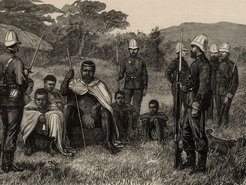Mutual dependencies and normative production in Africa
Joint Project

Junior Research Group at the Max Planck Institute for Legal History and Legal Theory
The Max Planck Institute for Legal History and Legal Theory (mpilhlt) participates in the Cluster of Excellence Beyond Slavery and Freedom at the University of Bonn, a collaborative research initiative that seeks to move beyond the traditional slavery / freedom binary by advancing the concept of asymmetrical dependency. This approach offers a more nuanced and precise analytical framework for examining historical inequalities and the distribution of power and resources across societies.
Within this framework, the Junior Research Group Mutual Dependencies and Normative Production in Africa, led by Dr. Raquel Razente Sirotti, explores how legal interactions in colonial Africa produced asymmetrical, yet mutual, dependencies between colonial agents, local intermediaries and indigenous communities. Challenging the conventional binary of collaboration versus resistance, the group investigates how these intermediaries had an active role in the production of colonial law, demonstrating that the interaction, recognition and even creation of local intermediaries by colonial agents implies mutual transformations of traditional and colonial authorities.
All case studies conducted by the group are focused on Mozambique, allowing for a deeply contextualised exploration of colonial legal dynamics. At the same time, these studies illuminate broader patterns across African colonial settings. Through close cooperation with Mozambican scholars, universities and archives, the group fosters a multidisciplinary approach that strengthens both local engagement and comparative insight.
A distinctive feature of the group’s work is its commitment to advancing methodological reflections on the use and production of oral sources and traditions in legal history – a field where such approaches remain significantly underexplored. In this context, the group has also produced a documentary podcast, Tramas Coloniais, which furthers this reflection by exploring not only the use of oral traditions as sources, but also how these sources themselves may shape new publication models and formats.




